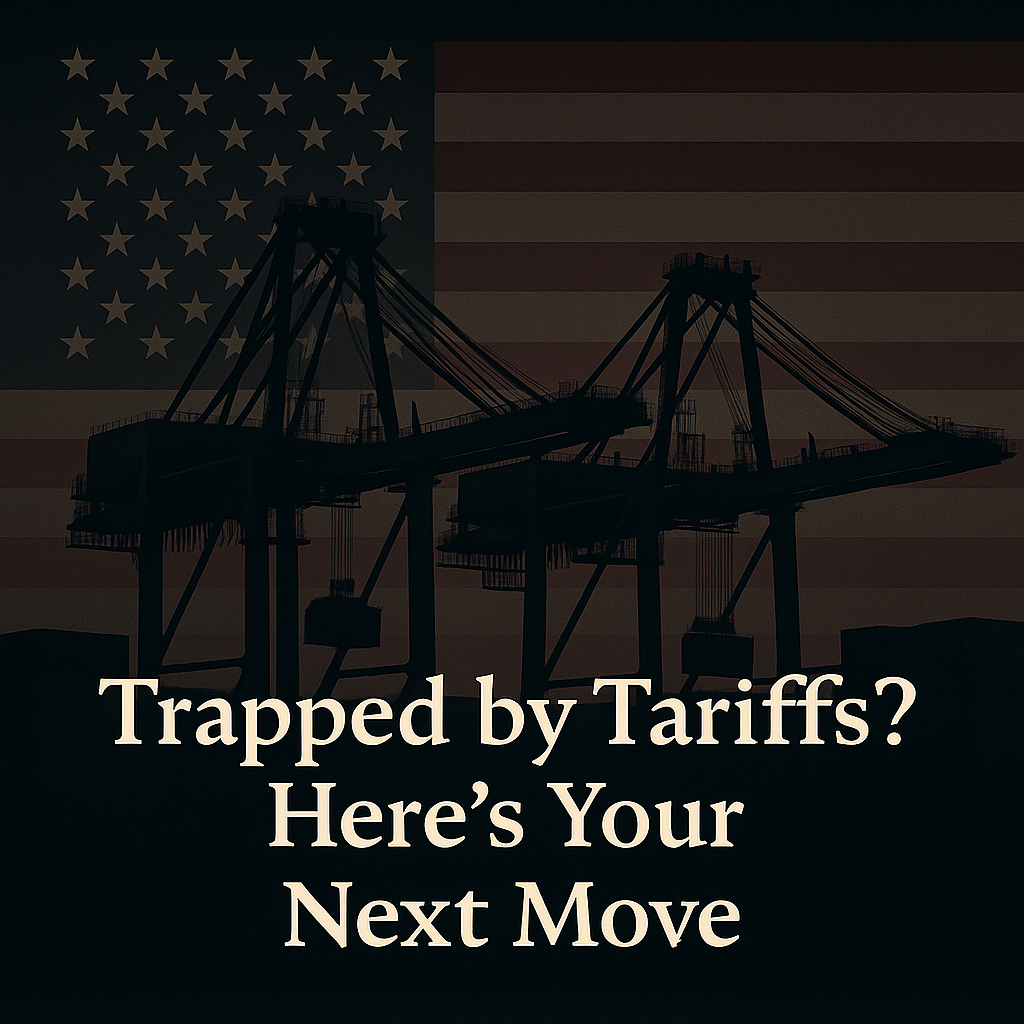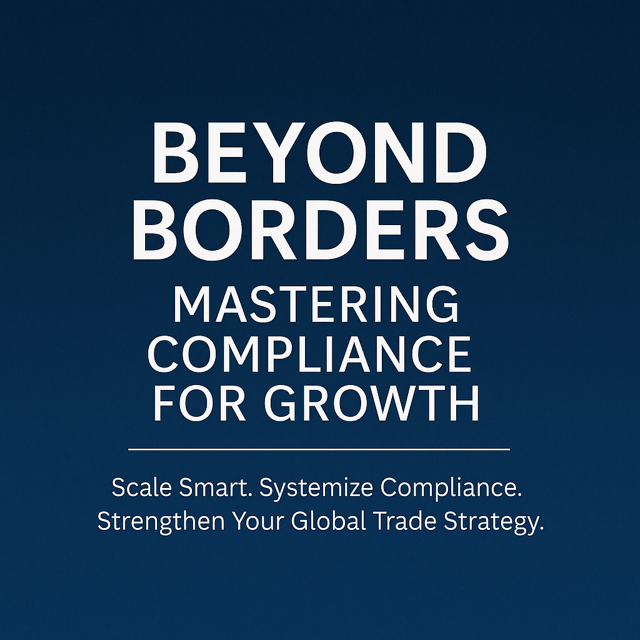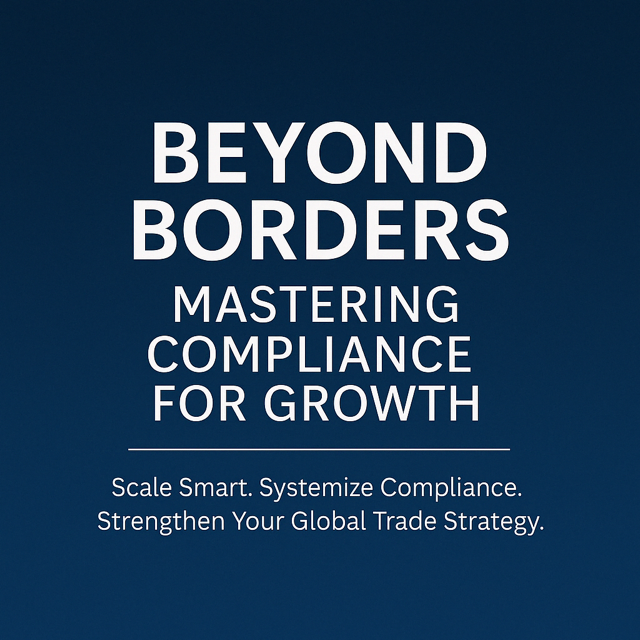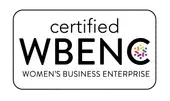Audio Conversation:
Full Blog Article:
As we close out this comprehensive 30-part series, one question remains front and center: What’s next for trade compliance?
For small and midsize businesses (SMBs), staying compliant in a fast-moving global economy isn’t just about ticking boxes; it’s about future-proofing your operations. In this final installment, we’re peering into the crystal ball to highlight emerging trends in trade compliance that every SMB should have on their radar.
Whether you’re a first-time importer or a growing exporter expanding into new markets, understanding these trends will position your business to operate smarter, stay compliant, and scale confidently in an ever-changing regulatory environment.
Digitalization of Customs and Border Procedures
Across the globe, customs agencies are embracing digital transformation, and that’s good news for SMBs.
What’s Changing?
Governments are digitizing clearance processes, document submissions, and tariff assessments. The U.S. Customs and Border Protection (CBP) continues to expand capabilities in the Automated Commercial Environment (ACE), encouraging importers and exporters to file electronically, reducing paperwork and delays. Many countries are implementing Single Window Systems, enabling traders to submit all regulatory documents through one platform.
Why It Matters
This evolution increases transparency, reduces fraud, and enhances efficiency. For SMBs with limited staff, these systems can streamline operations and provide better visibility into shipments.
Relevant blog reference: "Export Documentation: What Paperwork is Required for Shipping Goods Abroad?"
Growing Role of Artificial Intelligence and Trade Automation
AI and machine learning are no longer futuristic tools; they’re real-time allies in trade compliance.
How AI is Being Used
- Automated classification of HS codes
- Sanctions screening and denied party list checks
- Real-time risk flagging for valuation errors or unusual trade patterns
- Predictive analytics to forecast supply chain disruptions
Solutions like compliance software platforms are integrating these technologies to alert businesses of non-compliance risks before they escalate.
Why SMBs Should Pay Attention?
These tools remove human error, reduce reliance on manual tracking, and allow for scalable compliance processes even as your trade volume grows.
Relevant blog references: "Trade Compliance Software: How Can Technology Simplify the Compliance Process?" and "Automating Trade Compliance: Leveraging AI and Data Analytics for Accuracy."
ESG Compliance and Traceability Requirements
Environmental, Social, and Governance (ESG) regulations are becoming a core requirement in global trade, not just a corporate buzzword.
Key Regulations to Watch
- Uyghur Forced Labor Prevention Act (UFLPA)
- German Supply Chain Due Diligence Act
- EU Deforestation-Free Supply Chain Law
Regulators and consumers are demanding greater supply chain traceability to ensure ethical sourcing and reduce environmental harm.
SMB Action Step
Map your supply chain (Article 12: Supply Chain Security) and implement traceability tools to document origin, labor practices, and materials used in your products. This isn’t just about compliance it’s becoming essential to win contracts, especially with large retailers and international buyers.
Dynamic Tariff Changes and Geopolitical Disruptions
If there’s one thing this series has made clear, it’s that tariffs are never set in stone.
Recent Examples:
- Section 301 tariffs on Chinese goods
- Post-Brexit trade adjustments with the U.K.
- Ongoing USMCA origin verification requests
- Global retaliatory tariffs tied to sanctions and trade disputes
Geopolitics can shift trade rules overnight. SMBs that monitor trade policy and maintain flexible sourcing strategies will be better positioned to adapt.
Relevant blog references: "U.S.-UK Trade Post-Brexit, USMCA: Navigating the United States-Mexico-Canada Agreement", and "
Navigating U.S.-China Trade Relations."
Increased Enforcement Through Audits and Penalties
Customs authorities are tightening the net with post-entry audits, penalties for valuation errors, and scrutiny over country-of-origin claims.
What to Expect
- Audits of import valuation and classification
- Requests for supporting documentation like invoices, origin certificates, or ruling letters
- Greater enforcement of country-of-origin labeling
- Penalties for discrepancies or repeat violations
SMBs must ensure their compliance practices are proactive, not reactive.
Relevant blog references: "Valuation Methods", "Post-Entry Audit: What to Expect and How to Prepare", and "Country of Origin Marking."
Shift Toward Trusted Trader Programs
More businesses are being incentivized to become “trusted traders” through programs like:
- Customs Trade Partnership Against Terrorism (CTPAT)
- Authorized Economic Operator (AEO)
These programs offer benefits like fewer inspections, faster clearances, and global recognition, but they require robust internal controls and documentation.
Relevant blog reference:
"Authorized Economic Operator (AEO) Programs"
The Rise of Regional Trade Blocs and Agreements
Trade agreements aren’t just bilateral anymore, they’re regional ecosystems that can benefit SMBs.
Key Agreements to Track
- USMCA – North American integration
- African Growth and Opportunity Act (AGOA) – Opportunities with sub-Saharan Africa
- Indo-Pacific Economic Framework (IPEF) – In progress
- EU’s Digital Trade Provisions
Understanding origin rules and eligibility for these agreements can result in significant duty savings.
Relevant blog references: "Trade Agreements: What Are Free Trade Agreements?", "AGOA: How It Can Benefit U.S. Importers and Exporters", and "Import Tariff Exemptions."
SMBs Are Getting a Bigger Seat at the Global Table
The past few years have seen a significant push to level the playing field for smaller businesses. International bodies like the World Trade Organization (WTO) and the U.S. Small Business Administration (SBA) are pushing for more resources and simplified procedures that make global trade more accessible.
What This Means
Governments and service providers (like freight forwarders and brokers) are beginning to offer simplified filing, flat-rate pricing, and compliance toolkits designed specifically for SMBs.
How a Customs Broker Can Help Future-Proof Your Business
As these trends take shape, a trusted U.S. customs broker becomes more than a clearance agent, they become a strategic partner.
Here’s how they can support you:
- Monitor regulatory changes and tariff updates
- Help implement digital compliance systems
- Offer guidance on FTAs and valuation methods
- Manage documentation for audits and trusted trader programs
- Assist in risk mitigation and supply chain traceability
Whether you’re navigating your first import or scaling exports across borders, a customs broker can bridge the knowledge gap and help you stay compliant today and in the future.
Summary:
Key Takeaways
- Digital tools, AI, and automation are reshaping how trade compliance is managed.
- ESG and traceability requirements are becoming mandatory, not optional.
- Tariff volatility and geopolitical risks demand agile supply chains.
- Customs enforcement is increasing, especially on documentation and classification.
- New trade agreements and trusted trader programs present new opportunities.
- SMBs have more resources than ever, if they know where to look.
Frequently Asked Questions (FAQs):
Q1: How can small businesses keep up with all the trade compliance changes happening globally?
A1: Partner with a customs broker or trade compliance consultant, subscribe to official government newsletters (like CBP and BIS), and consider investing in trade compliance software that alerts you to updates and changes in real-time.
Q2: What’s the biggest mistake small businesses make when starting to import or export?
A2: Rushing into international trade without understanding the compliance requirements, especially around HS codes, valuation, and documentation. This can lead to penalties, delayed shipments, or denied entries.
Q3: What’s one thing I should invest in if I plan to grow my global trade operations next year?
A3:
A scalable trade compliance solution, whether that’s software, a broker, or training for your internal team. The more complex your trade activity becomes, the more critical automated and expert-supported compliance management becomes.
🎧🎙️ Want to hear more? Stay informed and inspired through two powerful channels:
-
Borders & Bourbon
- A Global Trade Podcast – Pour yourself a glass and join us for real talk on international trade. This show delivers solution-driven insights tailored for small businesses navigating the complexities of global markets. Available on all major streaming platforms.
-
Global Trade Navigator
- Prefer to read or listen to quick, practical tips? Explore our blog series or tune into the companion podcast on Spotify, where we break down each article to help you chart a smarter course through import/export compliance.
No matter your style, sip and listen, or scroll and learn, we’ve got your global trade journey covered.
References:
- U.S. Customs and Border Protection (CBP) – Link
- World Trade Organization (WTO) – Link
- U.S. International Trade Administration – Link
- BIS Denied Parties List – Link
- European Commission ESG Trade Policy –
Link
If you're curious to see how we can help, please visit our website
http://magneticprecision.com/. For inquiries and questions, contact us at
inquiries@magneticprecision.com.
Stay tuned for more insights as we continue our journey to mastering global trade compliance!





